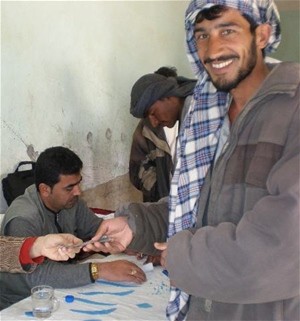Home » Reports & Data » Progress » Transforming Lives » Canal Cleaning Improves Irrigation and Incomes

More than 1,400 workers earned an income from cleaning the Balkh Canal.
USAID/ASAP
Cash-for-work program helps Balkh residents provide for their families while improving water flow.
12 AUGUST 2009 | MAZARI SHARIF, AFGHANISTAN
Residents of Balkh Province are able to buy food and essential household items thanks to a cash-for-work project that is improving irrigation throughout the region.
The Balkh Canal rehabilitation is one of several cash-for-work projects implemented by USAID to improve water flow and increase agricultural production. The canal cleaning also provided needed employment to laborers in the area, who frequently had trouble finding work to provide for their families.
Haji Rahmat is one of 1,414 Afghan workers who together received payments of nearly $250,000 for 26 days of hard work dredging the Balkh Canal. “We needed loans from the welfare office or from family in the past, and we had difficulty paying the money back,” said Rahmat, a Balkh resident. “This year we were able to buy needed household items without going into debt. We really appreciate the help of the American people.”
The Balkh Canal serves as the main conduit to a larger irrigation network and is located in the most fertile area of the province. Locals residents reported that some sections of the canal had not been maintained in more than seven generations. A buildup of silt was choking the canal and severely decreasing irrigation to farmland.
The workers clearly understood the long-term benefits of the project during their days of digging in the scorching sun. They dredged nearly 90,000 cubic meters of silt from the sides of a seven-kilometer section of the canal.
“The workers cleared over 17,000 additional cubic meters of silt that was not in the plans, even though they knew they would be paid for only 26 days,” said senior engineer Abdul Qadeem. “This demonstrates that the workers were motivated by the developmental aspect of the project and not simply by the cash.”
Now, farmers throughout the area will benefit from increased irrigation to their fields, agricultural production will increase, and local workers have some extra income in their pockets to provide for their families.







Comment
Make a general inquiry or suggest an improvement.